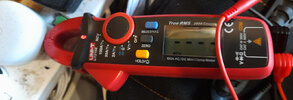As I understand it.The question is, will I need to upgrade the board before putting the house on rent? I know the reason why to do it, but it is not mandatory right?
The law on electricity in rented properties references the 18th edition of BS7671 which requires RCD protection on pretty much everything. However the 18th edition (like many previous) editions says something along the lines of "Existing installations that have been installed in accordance with earlier editions of the Regulations may not comply with this edition in every respect. This does not necessarily mean that they are unsafe for continued use or require upgrading." (I copy/pasted that from an IET page, I know the regs themselves have a substantially similar statement but I'm not 100% sure the wording is identical.
Said law also requires you to get a "satisfactory" electrical inspection. It doesn't explicitly use the term EICR, but that is how the reugulation has been implemented/interpreted in practice. In practice to get a satisfactory inspection any C1 or C2 defects need to be rectified.
The precise coding of defects is not defined by BS7671 itself, and is left somewhat up to the opinion of the inspector and industry guidance. However given what industry guidance says, It would be a pretty foolhardy inspector who gave a house or ground floor flat with no RCD protection at all a "satisfactory" result.


